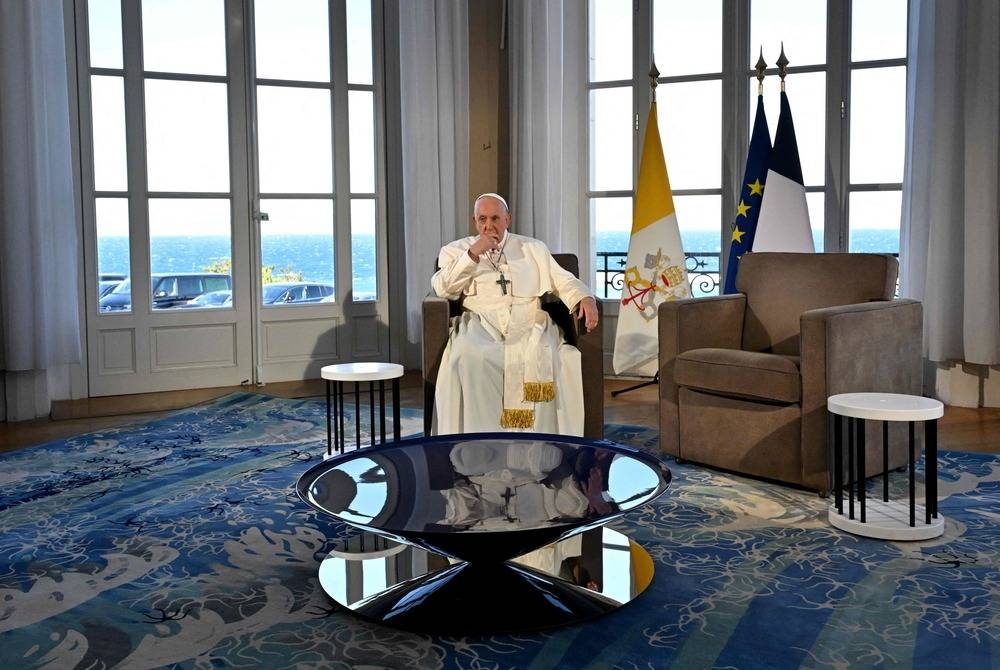Pope urges Europe against treating migrants as invaders
TOM BARFIELD
MARSEILLE - Pope Francis on Saturday urged European governments to welcome migrants instead of viewing them as invaders, striding into in a hugely sensitive political debate again inflamed by mass arrivals.
"Those who risk their lives at sea do not invade, they look for welcome," Francis said in a speech closing a conference of bishops and young people from around the Mediterranean in the French port city of Marseille.
Migration is "a reality of our times, a process that involves three continents around the Mediterranean and that must be governed with wise foresight, including a European response," the pontiff added.
Francis' 35-minute speech drew a standing ovation from his audience, but his position on migration was unlikely to please French President Emmanuel Macron and Interior Minister Gerald Darmanin, who were both present and plan tougher measures to control arrivals.
The pope's forceful interventions come as the migration debate has been stoked by mass arrivals on the Italian island of Lampedusa last week.
Speaking at a monument to people lost at sea on his arrival in Marseille on Friday, the pontiff had insisted that "people who are at risk of drowning when abandoned on the waves must be rescued".
He thanked aid groups rescuing migrants in danger at sea, condemning efforts to prevent their work as "gestures of hate".
Tens of thousands of people are expected to watch Francis as he travels through the streets of Marseille later Saturday before celebrating mass for almost 60,000 people in the city's famed Velodrome stadium.
Up to 100,000 are expected to line the Avenue du Prado for his "popemobile" tour and many roads are decked out with the white-and-yellow colours of the Vatican.
Francky Domingo, a Beninese man who heads a group of undocumented migrants in Marseille, said he hoped the pontiff's visit would "give us back a little hope" and "calm the political tensions".
The Mediterranean port is a "cosmopolitan, multicultural, multireligious" hub but "faces huge difficulties, drug trafficking that costs human lives every day (and) the problem of housing", Domingo added.
Around 40 people have been killed in shootings in Marseille this year, and Macron has promised billions of euros to upgrade city infrastructure in a bid to stop the downward spiral.
Not everyone has welcomed the Pope's visit.
Some politicians on the left have criticised Macron's decision to attend Saturday's mass as an infringement of state secularism.
Others on the right have attacked Francis for "interfering" in domestic politics.
The pontiff did nothing Saturday to dodge such allegations, appearing to weigh in on two of Macron's projects -- assisted dying and inscribing the right to abortion in the constitution.
Old people risk being "pushed aside, under the false pretences of a supposedly dignified and 'sweet' death that is more 'salty' than the waters of the sea," Francis warned.
He also spoke of "unborn children, rejected in the name of a false right to progress, which is instead a retreat into the selfish needs of the individual".
Francis' messages may have less resonance given Catholicism's long decline in France.
Fewer than a third of people still say they are Catholic, and only a fraction of those regularly attend mass.
The country's religious heritage nevertheless still has enormous weight, with Macron showing off progress in restoring the fire-ravaged Notre Dame cathedral in central Paris to Britain's King Charles III this week.
He has also announced tax breaks for contributions to a fund to renovate church buildings in villages too small to take on the repairs themselves. - AFP










